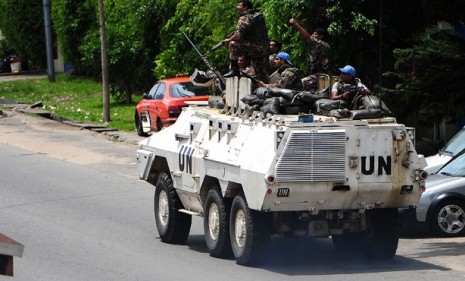Should the West have intervened sooner in the Ivory Coast?
After four months of fighting following the African nation's disputed election, U.N. help finally brings the conflict close to its end. Could the bloodshed have been stopped sooner?

A free daily email with the biggest news stories of the day – and the best features from TheWeek.com
You are now subscribed
Your newsletter sign-up was successful
The violent crisis in the Ivory Coast appeared to be nearing a decisive moment Thursday, as forces loyal to the country's elected president, Alassane Ouattara, surrounded the home of his rival, former President Laurent Gbagbo, who still refuses to cede power. Four months of fighting have created a humanitarian crisis, with accusations of massacres by both sides. Ouattara's forces surged to the brink of victory this week as France and the United Nations sent helicopter gunships to bomb Gbagbo's arms depots. So if that's all it took, shouldn't the West have gotten involved sooner?
Yes, our inaction cost lives: Ivory Coast was already in turmoil when the Western allies started bombing Libya, says Simon Akam in The New Republic. The difference is Libya has oil; Ivory Coast has cacao. "Even if Gbagbo is ousted and Outtara finally takes power, no thanks to the West, it's likely that thousands have died, and untold suffering certainly has rained down on the Ivorian people." All that could have been avoided if the West had "shown some stomach," and acted earlier.
"How the West failed Ivory Coast"
The Week
Escape your echo chamber. Get the facts behind the news, plus analysis from multiple perspectives.

Sign up for The Week's Free Newsletters
From our morning news briefing to a weekly Good News Newsletter, get the best of The Week delivered directly to your inbox.
From our morning news briefing to a weekly Good News Newsletter, get the best of The Week delivered directly to your inbox.
Better late than never: It took awhile for the world to recover its appetite for war, says Jon Swaine in The Telegraph, after the way George W. Bush blundered into Iraq. But the U.N. Security Council resolutions on Libya and Ivory Coast showed that the U.N. is now "taking seriously the 'Responsibility to Protect' doctrine, adopted in 2006, promising 'timely and decisive action' against atrocities." The suffering in Ivory Coast could have ended sooner, but without Western action, it might not have ended at all.
"Ivory Coast: UN air strikes show West's new appetite for military action"
The bloodshed will continue: The fight for control may be nearing an end, says Evelyn Leopold in The Huffington Post, but "explosive divisions remain unresolved" in the former French colony. After Ouattara, a Muslim, takes over from Gbagbo, a Christian, the country will still be divided between the largely Muslim north and Christian south, with old ethnic tensions complicating the mix. After "months of unthinkable horror," Ivorians now can look forward to "revenge killings," and more suffering.
"Ivory Coast: Will a change of leadership stop civil war?"
A free daily email with the biggest news stories of the day – and the best features from TheWeek.com
-
 The 8 best TV shows of the 1960s
The 8 best TV shows of the 1960sThe standout shows of this decade take viewers from outer space to the Wild West
-
 Microdramas are booming
Microdramas are boomingUnder the radar Scroll to watch a whole movie
-
 The Olympic timekeepers keeping the Games on track
The Olympic timekeepers keeping the Games on trackUnder the Radar Swiss watchmaking giant Omega has been at the finish line of every Olympic Games for nearly 100 years